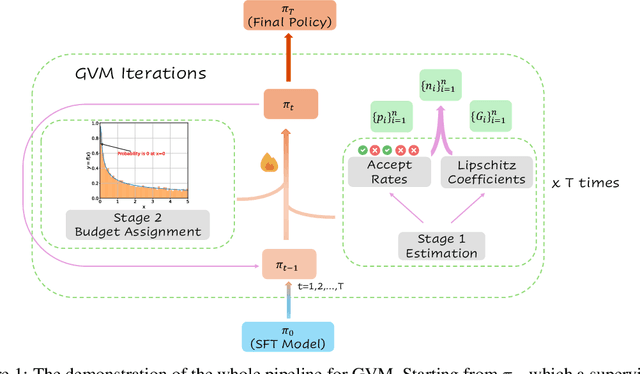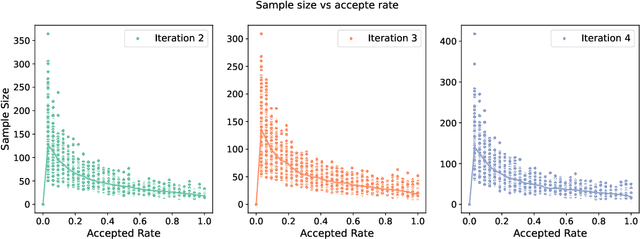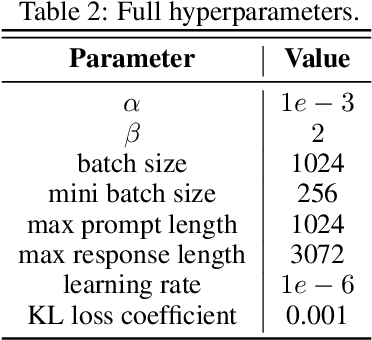Hanning Zhang
PhysProver: Advancing Automatic Theorem Proving for Physics
Jan 22, 2026Abstract:The combination of verifiable languages and LLMs has significantly influenced both the mathematical and computer science communities because it provides a rigorous foundation for theorem proving. Recent advancements in the field provide foundation models and sophisticated agentic systems pushing the boundaries of formal mathematical reasoning to approach the natural language capability of LLMs. However, little attention has been given to the formal physics reasoning, which also heavily relies on similar problem-solving and theorem-proving frameworks. To solve this problem, this paper presents, to the best of our knowledge, the first approach to enhance formal theorem proving in the physics domain. We compose a dedicated dataset PhysLeanData for the task. It is composed of theorems sampled from PhysLean and data generated by a conjecture-based formal data generation pipeline. In the training pipeline, we leverage DeepSeek-Prover-V2-7B, a strong open-source mathematical theorem prover, and apply Reinforcement Learning with Verifiable Rewards (RLVR) to train our model PhysProver. Comprehensive experiments demonstrate that, using only $\sim$5K training samples, PhysProver achieves an overall 2.4\% improvement in multiple sub-domains. Furthermore, after formal physics training, we observe 1.3\% gains on the MiniF2F-Test benchmark, which indicates non-trivial generalization beyond physics domains and enhancement for formal math capability as well. The results highlight the effectiveness and efficiency of our approach, which provides a paradigm for extending formal provers outside mathematical domains. To foster further research, we will release both our dataset and model to the community.
Optimizing Chain-of-Thought Reasoners via Gradient Variance Minimization in Rejection Sampling and RL
May 05, 2025



Abstract:Chain-of-thought (CoT) reasoning in large language models (LLMs) can be formalized as a latent variable problem, where the model needs to generate intermediate reasoning steps. While prior approaches such as iterative reward-ranked fine-tuning (RAFT) have relied on such formulations, they typically apply uniform inference budgets across prompts, which fails to account for variability in difficulty and convergence behavior. This work identifies the main bottleneck in CoT training as inefficient stochastic gradient estimation due to static sampling strategies. We propose GVM-RAFT, a prompt-specific Dynamic Sample Allocation Strategy designed to minimize stochastic gradient variance under a computational budget constraint. The method dynamically allocates computational resources by monitoring prompt acceptance rates and stochastic gradient norms, ensuring that the resulting gradient variance is minimized. Our theoretical analysis shows that the proposed dynamic sampling strategy leads to accelerated convergence guarantees under suitable conditions. Experiments on mathematical reasoning show that GVM-RAFT achieves a 2-4x speedup and considerable accuracy improvements over vanilla RAFT. The proposed dynamic sampling strategy is general and can be incorporated into other reinforcement learning algorithms, such as GRPO, leading to similar improvements in convergence and test accuracy. Our code is available at https://github.com/RLHFlow/GVM.
Self-rewarding correction for mathematical reasoning
Feb 26, 2025Abstract:We study self-rewarding reasoning large language models (LLMs), which can simultaneously generate step-by-step reasoning and evaluate the correctness of their outputs during the inference time-without external feedback. This integrated approach allows a single model to independently guide its reasoning process, offering computational advantages for model deployment. We particularly focus on the representative task of self-correction, where models autonomously detect errors in their responses, revise outputs, and decide when to terminate iterative refinement loops. To enable this, we propose a two-staged algorithmic framework for constructing self-rewarding reasoning models using only self-generated data. In the first stage, we employ sequential rejection sampling to synthesize long chain-of-thought trajectories that incorporate both self-rewarding and self-correction mechanisms. Fine-tuning models on these curated data allows them to learn the patterns of self-rewarding and self-correction. In the second stage, we further enhance the models' ability to assess response accuracy and refine outputs through reinforcement learning with rule-based signals. Experiments with Llama-3 and Qwen-2.5 demonstrate that our approach surpasses intrinsic self-correction capabilities and achieves performance comparable to systems that rely on external reward models.
Entropy-Regularized Process Reward Model
Dec 15, 2024



Abstract:Large language models (LLMs) have shown promise in performing complex multi-step reasoning, yet they continue to struggle with mathematical reasoning, often making systematic errors. A promising solution is reinforcement learning (RL) guided by reward models, particularly those focusing on process rewards, which score each intermediate step rather than solely evaluating the final outcome. This approach is more effective at guiding policy models towards correct reasoning trajectories. In this work, we propose an entropy-regularized process reward model (ER-PRM) that integrates KL-regularized Markov Decision Processes (MDP) to balance policy optimization with the need to prevent the policy from shifting too far from its initial distribution. We derive a novel reward construction method based on the theoretical results. Our theoretical analysis shows that we could derive the optimal reward model from the initial policy sampling. Our empirical experiments on the MATH and GSM8K benchmarks demonstrate that ER-PRM consistently outperforms existing process reward models, achieving 1% improvement on GSM8K and 2-3% improvement on MATH under best-of-N evaluation, and more than 1% improvement under RLHF. These results highlight the efficacy of entropy-regularization in enhancing LLMs' reasoning capabilities.
InfoPattern: Unveiling Information Propagation Patterns in Social Media
Nov 27, 2023



Abstract:Social media play a significant role in shaping public opinion and influencing ideological communities through information propagation. Our demo InfoPattern centers on the interplay between language and human ideology. The demo (Code: https://github.com/blender-nlp/InfoPattern ) is capable of: (1) red teaming to simulate adversary responses from opposite ideology communities; (2) stance detection to identify the underlying political sentiments in each message; (3) information propagation graph discovery to reveal the evolution of claims across various communities over time. (Live Demo: https://incas.csl.illinois.edu/blender/About )
R-Tuning: Teaching Large Language Models to Refuse Unknown Questions
Nov 16, 2023



Abstract:Large language models (LLMs) have revolutionized numerous domains with their impressive performance but still face their challenges. A predominant issue is the propensity for these models to generate non-existent facts, a concern termed hallucination. Our research is motivated by the observation that previous instruction tuning methods force the model to complete a sentence no matter whether the model knows the knowledge or not. When the question is out of the parametric knowledge, it will try to make up something and fail to indicate when it lacks knowledge. In this paper, we present a new approach called Refusal-Aware Instruction Tuning (R-Tuning). This approach is formalized by first identifying the knowledge gap between parametric knowledge and the instruction tuning data. Then, we construct the refusal-aware data based on the knowledge intersection, to tune LLMs to refrain from responding to questions beyond its parametric knowledge. Experimental results demonstrate this new instruction tuning approach effectively improves a model's ability to answer known questions and refrain from answering unknown questions. Furthermore, when tested on out-of-domain datasets, the refusal ability was found to be a meta-skill that could be generalized to other tasks. Further analysis surprisingly finds that learning the uncertainty during training displays a better ability to estimate uncertainty than uncertainty-based testing. Our code will be released at https://github.com/shizhediao/R-Tuning.
Towards Boosting the Channel Attention in Real Image Denoising : Sub-band Pyramid Attention
Dec 23, 2020



Abstract:Convolutional layers in Artificial Neural Networks (ANN) treat the channel features equally without feature selection flexibility. While using ANNs for image denoising in real-world applications with unknown noise distributions, particularly structured noise with learnable patterns, modeling informative features can substantially boost the performance. Channel attention methods in real image denoising tasks exploit dependencies between the feature channels, hence being a frequency component filtering mechanism. Existing channel attention modules typically use global statics as descriptors to learn the inter-channel correlations. This method deems inefficient at learning representative coefficients for re-scaling the channels in frequency level. This paper proposes a novel Sub-band Pyramid Attention (SPA) based on wavelet sub-band pyramid to recalibrate the frequency components of the extracted features in a more fine-grained fashion. We equip the SPA blocks on a network designed for real image denoising. Experimental results show that the proposed method achieves a remarkable improvement than the benchmark naive channel attention block. Furthermore, our results show how the pyramid level affects the performance of the SPA blocks and exhibits favorable generalization capability for the SPA blocks.
 Add to Chrome
Add to Chrome Add to Firefox
Add to Firefox Add to Edge
Add to Edge